
Singaporeans expect 3.1% inflation in the next twelve months
The survey showed a marginal easing of expectations on prices.
Singapore’s expectations for headline inflation one year ahead edged down to 3.1% in March, from 3.2% in December 2019, according to a Singapore Management University (SMU) survey. This is slightly below the 2012-2019 Q1 average of 3.4%.
After adjusting for potential behavioral biases and re-combining across components, the overall inflation expectations eased to 2.9% in March compared to 3% in December 2019.
“The latest survey shows a marginal easing of expectations, perhaps indicating incomplete passthrough of global oil price decline at local pumps, as well as lingering hopes of a deep but short contraction in activities,” DBS chief economist Taimur Baig commented.
Also read: Inflation to ease further amidst collapse in demand
Excluding accommodation and private road transportation-related costs, the one-year-ahead core inflation expectations corrected to 3.1%, from 3.4% over the same period.
For a subgroup of the population who own their accommodation and use public transport, the core inflation expectations pared to 2.9% from 3.0%, closely resembling Singapore’s Core Inflation Expectations.
The one-year-ahead composite index SInDEx, which puts less weight on more volatile components like accommodation, private transport, food and energy, polled at 3.1% in March compared to 3.2% a quarter prior. This lags behind the 2012-2019 Q1 average of 3.4%.
For the longer horizon, the five-year-ahead CPIEx inflation expectations stayed unchanged at 4.1% compared to the December 2019 outlook. However, the current polled number is still lower than the 2012–2019 Q1 average of 4.3%.
Around three in five respondents generally expected the COVID-19 situation to have a “moderate impact” on both the Singapore economy and household inflation expectations.
Around 57% believe the impact on inflation from the pandemic would be in the medium term or around 12 months ahead, but about 30% believe it might have a longer term or around five year ahead impact on inflation.
Further, around 10% of Singaporeans expect a 10% or more reduction in salary in the next 12 months. However, the study noted that this perception does not seem to be associated with their view on the impact on COVID-19.
























 Advertise
Advertise






